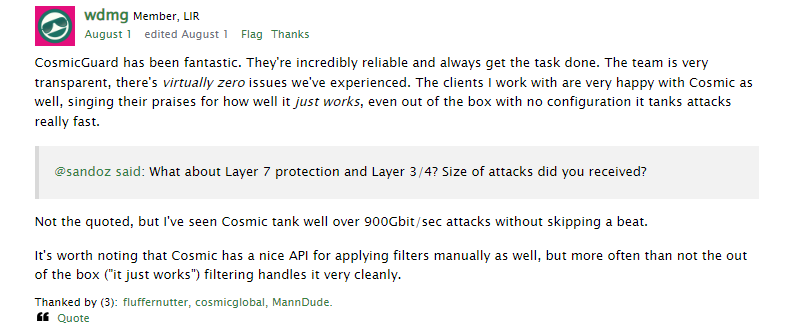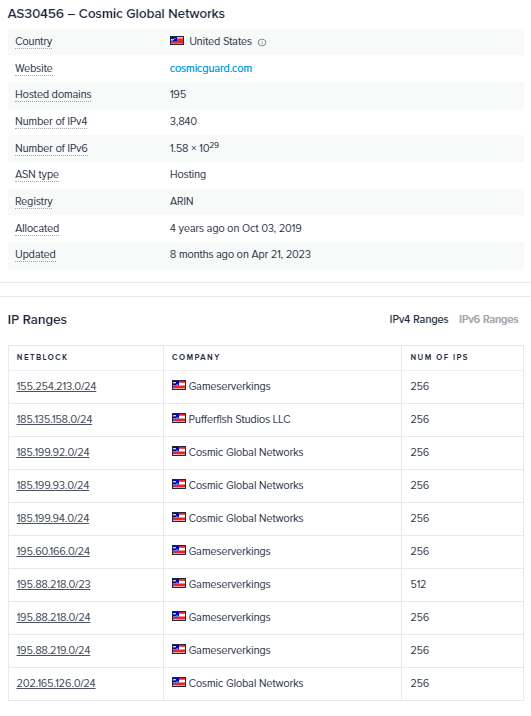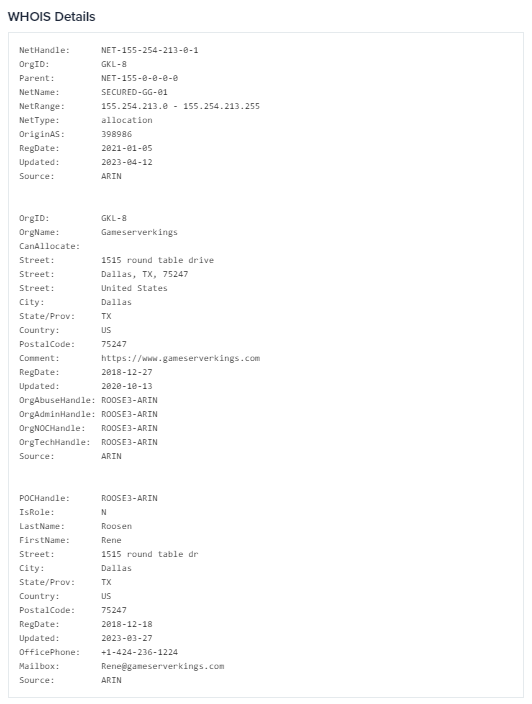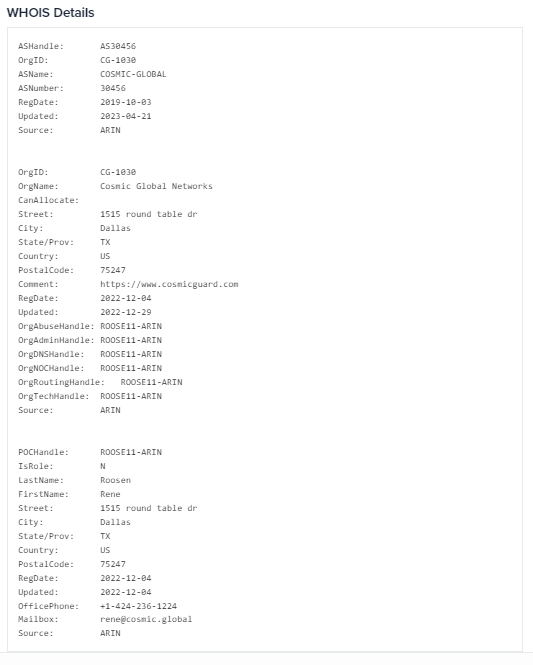
Marshal Webb, CEO of Path.net
Path.net is a well known DDoS protection provider in the LowEndUniverse, somewhat of a de facto standard; especially for anything revolving around custom filters or gaming.
However, they’re pretty controversial. About 50% of people like them because they simply get the job done well, and the other 50% hate them for X, Y and Z reasons.
Generally, the controversial claims revolve around the founder of Path, Marshal Webb’s “hacker” youth (chippy1337, is a former alias, alternatively LulzSec and Money Team are the group names he associated with), but there’s also a bit of an internal rift brewing and spilling over, causing even more controversy for Path…
Many of the people who previously worked for Path like @wdmg, @ChrisMiller, and @MannDude are not happy with Marshal Webb for whatever reason. It’s safe to say Marshal Webb isn’t a fan of them either…
In fact, every single person mentioned above, us included, has received a love letter from Path.
Though, out of anyone, Marshal Webb particularly has a beef with Curtis Gervais (@wdmg). He’s the former CEO/COO of Tempest Hosting, LLC (owned by Path Network, Inc).
I’ve known about ongoing court cases between the two in both the United States, where Path is from, and Canada, where Gervais is from, for months.
But the situation has been developing, and there really hasn’t been much to talk about. Especially considering the fact Canadian courts have very different rules and processes in comparison to the United States.
That is, until recently…
Discord Faces Path.net Subpoena in California Courts
Path requested a subpoena for documents on 11/22/23 in the Northern District of California, asking for documents from Discord, Inc:
UNITED STATES DISTRICT COURT
NORTHERN DISTRICT OF CALIFORNIA
SAN FRANCISCO DIVISIONIn Re Ex Parte Application of
Path Network, Inc., and Tempest Hosting,
LLC,
Applicants.Case No. 23-mc-80148-PHK
ORDER GRANTING IN PART AND
DENYING IN PART WITHOUT
PREJUDICE PATH NETWORK, INC.’S
AND TEMPEST HOSTING, LLC’S
APPLICATION TO SERVE
DISCOVERY ON DISCORD
PURSUANT TO 28 U.S.C. § 1782
Re: Dkt. Nos. 1, 19, 20–22Path Network, Inc. (“Path”) and Tempest Hosting, LLC (“Tempest”) (collectively
“Applicants”) have filed an ex parte application authorizing service of a subpoena for documents
on Discord, Inc. (“Discord”) pursuant to 28 U.S.C. § 1782. [Dkt. 1]. This application is made in
connection with an action pending in the Superior Court of Justice in Ontario, Canada (“Canadian
Court”). After considering the instant application, conducting a hearing, and considering
supplemental briefing, Applicants’ request is GRANTED-IN-PART and DENIED-IN-PART
WITHOUT PREJUDICE.
In regards to whom, you ask?
Gervais, of course.
Now, before we proceed any further, I need to point out that nearly everything hosting related will somehow will tie back to LowEndBox & LowEndTalk. I don’t know how. It just does.
This is no different. The official court documents even mention us by name:
Path’s Allegations Against Gervais
Path is an Arizona corporation providing data, hosting, and cyber services to subscribers.
Path’s wholly owned subsidiary, Tempest, is an Arizona company providing virtual
hosting services specializing in the leasing of services to customers.Applicants aver that Curtis Michael Gervais (“Gervais”), a Canadian citizen, was a Path and
Tempest customer in June 2020, and as such he became acquainted with the CEO of Path. [Dkt. 1-
2 at 24]. Around approximately July 8, 2021, Path hired Gervais to work as an independent
contractor for Tempest. Id. at 25. His work for Tempest continued through various employment
roles until eventually Tempest promoted him to CEO in approximately February 2022. Id. at 25–
29. On or before June 2022, Gervais allegedly hacked into the internal network of an entity called
Game Server Kings (“GSK”), a competitor of Applicants. Id. at 36. The investigation into this
activity led Tempest to demote Gervais to COO and he eventually resigned on September 16, 2022.
Id. at 37–39, 45–46.Prior to his work for Tempest, in November 2020, Gervais apparently started his own
company called Packet Rabbit, Inc. (“PR”), a Canadian corporation providing online virtual hosting
services that operates and leases services to customers for a monthly fee. Id. at 24–25. Gervais is
the sole director and officer of PR. Id.Applicants allege that, as the relationship deteriorated between Tempest and Gervais,
Gervais began undertaking actions adverse to Applicants through a variety of means. Id. at 46.
Applicants allege that Gervais disclosed Applicants’ confidential information to GSK and third
parties, made defamatory comments concerning Applicants, and told third parties of his intentions
to harm Applicants. [Dkt. 1-3 at 29]. Applicants allege that Gervais conspired with Rene Roosen,
CEO and founder of GSK, to harm Applicants. [Dkt. 1-2 at 11 n.1]. Specifically, Applicants allege
that Gervais provided Roosen with confidential and/or false information about Applicants, which
Roosen used to convince third parties to terminate their user agreements with Applicants and instead
start doing business with GSK. Id. at 42–44, 46–47.Germane to the instant dispute, Gervais and Roosen allegedly utilized Discord’s messaging
platform to communicate with each other and further the alleged plans to harm Applicants’ business.
Id. at 11 n.1. Furthermore, Gervais and Roosen allegedly utilized various usernames or aliases for
Discord accounts, such as “Archetype,” “1500,” “Renual,” and “cmg” as part of their efforts to
communicate their plans to harm Applicants. [Dkt. 1-1 at ¶¶ 4–5; Dkt. 1-2 at 53, 56–57].Specifically, the “Archetype” user account allegedly used Discord to communicate with an
employee of Path to offer to ransom or sell back stolen copies of Applicants’ confidential source
code and other confidential information for approximately $800,000. [Dkt. 1-2 at 54–58]. Further,
Applicants allege that Gervais used the alias or username “wdmg” for an account on an online forum
called LowEndTalk. Id. at 53. Applicants similarly allege that Gervais used an email address
deesnutiam@protonmail.com and submitted the username “Dees Nutiam” for a new user account
on the Tempest platform after he had separated from the company. Id. at 52.On January 5, 2023, Applicants acted on suspicions that Gervais acted to harm their business
using the alias Archetype, resulting in both pre-litigation investigation and the filing of the
underlying Canadian lawsuit germane to the instant dispute. Id. at 56.
Essentially, Path is saying Gervais tried to harm Path.
They specifically reference Gervais “hacking” Game Server Kings and then state he later “conspired with Rene Roosen,” the Game Server Kings founder, to harm Path.
Why Is Game Server Kings a Path Competitor?
Now, to give you a bit of LowEndUniverse background…
Game Server Kings, or GSK, is also known as Cosmic Guard. Another very popular DDoS mitigation provider.

Many of the people who previously worked for Path (like @manndude, @wdmg) now use and endorse Cosmic Guard:


You can see Rene Roosen mentioned on both GSK and Cosmic Guard’s ASN here:



I say this in the nature of fairness. I’m neither for nor against any parties involved here.
Let’s continue:
Path Requests Discord Save Data for Court Case
On December 21, 2022, Applicants allege they filed a Notice of Action, Motion Record, and
Factum (a type of brief or memorandum of law under Canadian procedural rules, see
https://courtofappealbc.ca/civil-family-law/guidebook-for-appellants/write-your-argument) in the
Canadian Court seeking pre-litigation evidence preservation and a general injunction. [Dkt. 1-3 at
2].Applicants allege that on January 9, 2023, the Canadian Court held an ex parte hearing on
Applicants’ filings and accepted ex parte briefing regarding issuing pre-litigation orders. Id. at 2–
3. The Canadian Court granted Applicants’ request and issued a pre-litigation evidence preservation
order; so-called “Anton Piller” Orders; a Stand and Deliver Order; and a general injunctive order.
Id. (the “Canadian Court Orders”). Under Canadian law, and in general terms, an Anton Piller Order
is a civil case order roughly analogous to an order granting permission for entry to land and
inspection (see Fed. R. Civ. P. 34(a)(2)) under which a party is allowed the right to enter a location
and seize evidence without advance notice to the party being searched, as part of an effort to reduce
the risk of destruction of evidence. [Dkt. 1-2 at 2]. Under Canadian law, and in general terms, a
Stand and Deliver Order requires individuals subject to the order to turn over off-site evidence and
assets. Id.Applicants allege that the Anton Piller Orders name certain individuals who were allowed
to enter Gervais’s home including several lawyers for Applicants and a data forensics expert for the
Applicants, specifically Tom Warren (“Warren”). [Dkt. 1-3 at 74]. Germane to the Section 1782
application at issue here, Warren submitted a declaration in support of Applicants here. [Dkt. 1-2].
The Anton Piller Orders require Gervais to “grant access and deliver up to the Authorized Persons”
certain evidence set forth in Schedule A to that order. [Dkt. 1-2 at 87]. Schedule A to the Anton
Piller Orders specifies that the evidence to be delivered includes “any and all communications,
whether in hard copy or electronic form, involving Gervais (including by any alias of Gervais
including but not limited to ‘cmg’ . . . ‘Archetype’[])” and “any and all of the following information,
electronic data and/or code of the Plaintiffs as advertised for sale or ransom online pursuant to the
information of ‘Archetype’ (refer to . . . the Discord message attached as Schedule ‘B’ to this
Order)[.]” Id. at 90.Following the execution of the Canadian Court Orders, the persons conducting the searches
for evidence delivered to their expert Warren three laptops, two cell phones, two iPads, and
numerous credit cards in PR’s name. [Dkt. 1-2 at 2]. Subsequently, Applicants allege Warren asked
Gervais to “provide access to his devices” and “various local and cloud-based applications / websites
within the scope of the Anton Piller Order.” Id. at 59. Applicants aver that “Gervais alleged that
he did not know the passwords to the applications / websites because all his log-in credentials were
stored on an encrypted password repository known as ‘LastPass.’” Id. Initially, Gervais provided
Warren with access to LastPass; however, Gervais allegedly later implemented security measures
to protect his computer from unauthorized access. Compare Dkt. 1-2 at 59, with Dkt. 1-2 at 62.
Applicants allege that Gervais created risks of evidence tampering of the data and messages in
Gervais’s online accounts because the LastPass program restricted access based on the device’s IP
address. [Dkt. 1-2 at 62]. Applicants allege that Warren noticed “Gervais was still able to access
his Discord account[,]” and when confronted about his ability to access that account, Gervais stated
“he could still use Discord because the session had not stopped.” Id. at 65. Applicants aver that
“Gervais[’s] information was false – that Mr. Warren had Gervais’[s] computer previously and the
Discord session was stopped when Mr. Warren shut down the laptop for [data collection].” Id.On March 9, 2023, Applicants allegedly asserted several claims against Gervais and PR in
connection with their alleged unlawful conduct. Id. at 18–79. After filing the Canadian lawsuit, on
April 10, 2023, Applicants requested that Discord preserve all messaging data related to Gervais
and Roosen. [Dkt. 1-1 at ¶ 3]. The following day Discord responded that it would not preserve the
requested data unless legally obligated to do so. Id. Subsequently, on May 22, 2023, Applicants
filed the instant application seeking to serve Discord a subpoena pursuant to Section 1782 in support
of the Canadian litigation. [Dkt. 1]. On August 17, 2023, the Court heard arguments on several
issues associated with the instant application. [Dkt. 16]. Afterwards, the parties met and conferred
in an effort to reach a resolution on several issues with the instant application. [Dkt. 17]. The Parties
reached agreement on one issue. [Dkt. 20]. Additionally, the Parties supplemented their briefing
regarding several remaining issues with the instant application. [Dkts. 20–22].
Summarization: Path is requesting information from Discord in regards to Gervais, Roosen (GSK/Cosmic Guard). They specifically want the information for the Canadian case.
The Proposed Subpoena
Applicants [Path] submitted to the Court their proposed subpoena for documents directed to
Discord, which is located in the geographic boundaries of the Northern District of California (as
discussed further below). See Dkt. 1-5. With regard to logistics, the proposed subpoena requests
that Discord produce documents in Los Angeles. Id. at 2. With regard to document categories
sought, the proposed subpoena requests that Discord produce “documents, electronically stored
information, or objects, and to permit inspection, copying, testing, or sampling of[:]”(1) All passwords and account data associated with Curtis Gervais,
including any aliases he used, such as cmg#8239;
(2) All passwords and account data associated with Rene Roosen,
including any aliases he used, such as Renual#7394;
(3) All passwords and account data associated with Archetype#8484;
(4) Roosen, Gervais and Archetype#8484’s login history for any and
all Discord accounts, including but not limited to cmg#8239,
Renual#7394, and Archetype#8484; and
(5) Any and all messaging data associated with any of Roosen,
Gervais, or Archetype#8484’s Discord account(s) including
cmg#8239, Renual#7394 and Archetype#8484.
Id. at 5.The subpoena names Curtis Gervais and Rene Roosen, as well as the three Discord account
usernames, but provides no other identifying information for these individuals or accounts. Id.Following oral argument and supplemental briefing, Applicants and Discord filed a joint
stipulation. [Dkt. 20]. In the stipulation, Discord states it would not object to the production of the
following documents, electronically stored information, or tangible things, which includes
documents, electronically stored information, or tangible things narrower than Applicants’ proposed
subpoena:1) All account data, not including the contents of electronic
communications, associated with Curtis Gervais, including any
aliases he used, such as cmg#82391;
2) All account data, not including the contents of electronic
communications, associated with Rene Roosen, including any aliases
he used, such as Renual#7394;
3) All account data, not including the contents of electronic
communications, associated with Archetype#8484;
4) Roosen, Gervais and Archetype#8484’s login history for any and
all Discord accounts, including but not limited to cmg#8239,
Renual#7394, and Archetype#8484; and
5) Any and all headers of messaging data associated with any of
Roosen, Gervais, or Archetype#8484’s Discord account(s) including
cmg#8239, Renual#7394 and Archetype#8484.[Dkt. 20 at 2]. Discord further defined certain subpoena terms including:
“Account data” includes a user’s first and last name, email address,
birthdate, and any other non-content identifying information for a
specific user.“Header” includes the name and email addresses of the sender,
recipient, and any copied or blind copied recipients in a particular
Discord message, and the time that message was sent and/or received.
Id.In other words, Discord represents that it would not object to searching for and producing
documents, electronically stored information, or tangible things sought as defined above. However,
Discord does object to searching for and producing any documents, electronically stored
information, or tangible things which fall outside the scope defined above but which would be within
the broader scope of Applicants’ initial subpoena as originally presented. Id.
The Result?
Accordingly, the Court concludes that the nature of the Canadian Court is such
that it is unlikely to object to judicial assistance from a U.S. District Court, and that the nature of
the proceedings abroad favors discretionary authorization of discovery here.Further, the record of proceedings from the Canadian litigation indicates that the Canadian
Court has taken steps and issued orders to seek, within its own jurisdiction, the type of discovery
and information sought here. As noted, the Anton Pillar Orders expressly order the production of
information and electronic files relating to the Discord messages and user accounts which are the
subjects of the instant request. [Dkt. 1-2 at 90]. In addition, the Canadian Court has extended the
Anton Pillar Order two separate times to allow Applicants to try to obtain cloud-related discovery.
Id. at 117–122. From the orders and steps taken by the Canadian Court, this Court concludes that
the Canadian Court would be receptive to information sought from Discord under Section 1782.
There is nothing in the record to imply, much less expressly indicate, that the Canadian Court would
reject any evidence produced by Discord in response to a properly issued subpoena under Section
1782. Accordingly, the Court finds that the third discretionary factor weighs in favor of discovery.
Further:
Here, the record of the proceedings in the Canadian lawsuit demonstrates that Applicants
pursued proof-gathering procedures in Canada extensively before filing the instant Application.
[Dkt. 1-2 at 18–79]. As summarized above, Applicants sought and were granted multiple Anton
Pillar Orders, executed on those Orders, followed up with Gervais on the passwords for accounts,
obtained extensions of the Anton Pillar Orders from the Canadian Court, and sought voluntary
cooperation from Discord. Id. Applicants demonstrated diligence in using the Canadian Court
system to try to obtain information about the Discord messages and accounts, both from Gervais
and from Discord. Id. Indeed, there is indication in the records provided that Gervais may have
taken steps to delay or hinder access to his Discord account by claiming lack of access to his
passwords stored in a LastPass account and by claiming lack of access to the email account linked
to this LastPass account. Id. at 62–63.Accordingly, the Court concludes that Applicants’ discovery request here is not an improper
attempt to undermine the Canadian Court or its policies or proof-gathering restrictions. Therefore,
the Court finds that this discretionary factor weighs in favor of discovery.
Here’s where things turn against Path’s favor:
While Applicants may know who Gervais and Roosen are and how to identify them, that
information is notable by its absence from the proposed subpoena. The proposed subpoena has no
“definition” section and fails to provide any supplemental or explanatory information about Gervais
or Roosen. For example, the proposed subpoena lacks any personally identifying information about
these persons, such as their home or correspondence addresses, business addresses, business
affiliations, telephone or cellphone numbers, email addresses, or any other collateral data already in
Applicants’ possession to substantiate their identities. See Dkt. 1-5 at 2. It is evident from the
materials provided this Court from the Canadian lawsuit that Applicants possess, minimally, at least
some ancillary set of information that could facilitate a more precise identification of Gervais and
Roosen to avoid burdening Discord in its search for responsive documents.Furthermore, this Court takes Judicial Notice that Discord’s registration panel appears to
require the following information to create a user account: an email address; a username; a
password; and a date of birth. See Create an Account, https://discord.com/register (last visited Aug.
9, 2023). If Applicants have email addresses and/or birth dates for Gervais and Roosen, that
information would appear to be helpful in reducing the burden on Discord in its attempts to comply
with a subpoena (indeed, Applicants’ application recites multiple email addresses which Applicants
believe Gervais has used, and yet inexplicably fails to include those in the subpoena).Additionally, it is unknown how many other persons among Discord’s worldwide customer
base have the same or similar names as Gervais and Roosen. Similarly, it is unknown how many
other users have user account names that are the same as or closely similar to “Archetype,”
“Renual,” or “cmg.” As drafted, the proposed subpoena would potentially implicate searching for
and perhaps even producing information from innocent third parties unrelated to the Canadian
lawsuit. The risk of misidentification of innocent parties and the disclosure of their personal
messages or other information is thus exacerbated by the lack of definitional or narrowing
information about Gervais and Roosen in the proposed subpoena. Thus, the proposed subpoena is
not only unduly burdensome but also unduly intrusive, particularly with regard to the universe of
innocent third parties whose information and data may be swept up by an overbroadly worded
subpoena and resulting search.As a consequence, the breadth of the subpoena as drafted risks compelling Discord to embark
on a potentially complex task of discerning the specific “Curtis Gervais” or “Rene Roosen”
contemplated by the subpoena in order to filter out any false hits or misidentified persons. Thus,
the subpoena as drafted risks imposing further undue burden on Discord both in its search for
responsive documents and in its attempts to reasonably filter out the truly irrelevant misidentified
information from the information on the specific Messrs. Gervais and Roosen actually of interest.Accordingly, the Court finds that application of this final Intel discretionary factor militates
against approval of the proposed subpoena as presented to the Court. However, the Court finds that
Applicants’ failure to satisfy this discretionary factor does not require a negative finding on the
threshold issue of whether any discovery should be authorized in the first instance; rather this factor
requires the Court to find that the proposed discovery, in its present form, should be modified
because, as literally drafted, the proposed subpoena to Discord is overbroad, not narrowly tailored,
unduly intrusive, and burdensome under the applicable legal standards. Therefore, the Court
GRANTS-IN-PART Applicants’ application for leave to serve a document subpoena on Discord,
and GRANTS Applicants leave to submit a revised subpoena as discussed further herein after
appropriate meet and confer with Discord.
That’s not it, though…
Introducing The Stored Communications Act
The SCA “prohibits electronic communication service providers from ‘knowingly
divulg[ing] to any person or entity the contents of a communication while in electronic storage by
that service.’” Obodai v. Indeed, Inc., No. 13-mc-80027-EMC, 2013 WL 1191267, at *2 (N.D. Cal.
Mar. 21, 2013) (citing 18 U.S.C. § 2702(a)(1); Optiver Australia Pty. Ltd. & Anor. v. Tibra Trading
Pty. Ltd. & Ors., No. 12-cv-80242-EJD (PSG), 2013 WL 256771 (N.D. Cal. Jan. 23, 2013)). The
SCA incorporates the definition of “contents” from the Wiretap Act. In re Zynga Priv. Litig., 750
F.3d 1098, 1105–06 (9th Cir. 2014) (citing 18 U.S.C. § 2711(1); 18 U.S.C. § 2510(8)). The SCA
defines “contents” as “any information concerning the substance, purport, or meaning of [a]
communication.” Id. The Zynga Court held the words “substance, purport, or meaning” carry their
dictionary definitions which indicate that “Congress intended the word ‘contents’ to mean a person’s
intended message to another.” Id. (the Zynga Court defines: “substance” as “the characteristic and
essential part;” “purport” as “meaning conveyed, professed or implied;” and “meaning” as “the thing
one intends to convey . . . by language[.]”) (citing Webster’s Third New International Dictionary
1399, 1847, 2279 (1981))).The issue of discovery of electronic communications can implicate Fourth Amendment
concerns. S. REP. 99-541, 2–3, 1986 U.S.C.C.A.N. 3555, 3556–57. “The SCA was enacted
because the advent of the Internet presented a host of potential privacy breaches that the Fourth
Amendment does not address.” Sams v. Yahoo! Inc., 713 F.3d 1175, 1179 (9th Cir. 2013) (citation
omitted). However, often times the “existing statutory framework is ill-suited to address modern
forms of communication[.]” Konop v. Hawaiian Airlines, Inc., 302 F.3d 868, 874 (9th Cir. 2001).
“Courts have struggled to analyze problems involving modern technology within the confines of
this statutory framework, often with unsatisfying results.” Id. (citations omitted).
Applicants argue passwords are not afforded protection under the SCA because passwords
should not be considered “content.” [Dkt. 21 at 5].Discord argues passwords are implicitly
included within the SCA’s prohibitions because passwords implicate communications. [Dkt. 21 at
7; Dkt. 22 at 6–7]. In other words, Discord argues that passwords are “content “ under the SCA
because they are “information concerning the substance, purport, or meaning” of a communication.
For the reasons explained herein, the Court find passwords are content under SCA.
Keep in mind the original proposed subpoena from Path:
(1) All passwords and account data associated with Curtis Gervais,
including any aliases he used, such as cmg#8239;
(2) All passwords and account data associated with Rene Roosen,
including any aliases he used, such as Renual#7394;
(3) All passwords and account data associated with Archetype#8484;
(4) Roosen, Gervais and Archetype#8484’s login history for any and
all Discord accounts, including but not limited to cmg#8239,
Renual#7394, and Archetype#8484; and
(5) Any and all messaging data associated with any of Roosen,
Gervais, or Archetype#8484’s Discord account(s) including
cmg#8239, Renual#7394 and Archetype#8484.
California Courts Find That Passwords Are Protected Under the Stored Communications Act
Accordingly, this Court find that passwords are afforded protections under the SCA.
However, this does not end the dispute. The Court next address whether Gervais consented to the
disclosure of the content of his communications.
This is followed up with:
The Court finds that Gervais’s actions, as presented on the current record, fail to show that
he did implicitly consent to Discord disclosing the contents of his communications. First, the mere
fact Gervais is on notice of his obligation under the Canadian Orders does not indicate his consent
to the disclosure of the contents of his communications. Indeed, the fact that he was ordered by the
Canadian court to allow searches and inspections of his electronic devices indicates he opposed such
disclosures and would not allow them voluntarily (otherwise, there would be no need for an order
from the Canadian court).Secondly, a Court order to produce the communication subject to a judicial decree stemming
from the Canadian Litigation does not amount to Gervais consenting to Discord disclosing the
content of the communication. Instructive is the Ninth Circuit’s analysis in Suzlon, 671 F.3d at 731,
where the court explained that compliance with foreign civil litigation rules does not amount to
implied consent. In that case, the party seeking a finding of implied consent, Suzlon, argued that
“under Australian civil litigation rules, a litigant is obligated to list and disclose documents that
would include the emails at issue,” but the Ninth Circuit indicated this obligation does not amount
to implied consent. Id. Rather, the Court stated the Australian civil litigation rules required “Sridhar
himself . . . be responsible for disclosing [the content of the communications,]” not the non-party
Microsoft, Corp. Id.Furthermore, Gervais’s actions detailed in Mr. Warren’s affidavit indicate that he does not
implicitly consent to the production of the contents of his communications. The “various instances
of delay tactics, lack of cooperation, and outright obstruction[]” highlighted by Discord indicate
Gervais would not consent to the production of the content of the communications on Discord. See
Dkt. 21 at 9 (citing Dkt. 1-2 at 3 (“Gervais … ha[s] not rendered the ‘necessary assistance’ required”
under the Anton Piller order such that Warren “ha[s] been frustrated by Gervais in [Warren’s] efforts
to preserve data”), 5 (expressing concern that Gervais would delete or alter information though he
allowed the search), 8 (Gervais failing to respond to Warren’s attempts to access password
repository and that “Gervais had booby-trapped his own . . . account”), 11 (finding Gervais’s
explanations “not credible” in part because Gervais continued to access Discord), 12 (Gervais used
a hotkey in Warren’s presence to delete email account data) 12–13 (recounting Gervais’s
misrepresentations concerning his access to Discord)).While such tactics by Gervais may be
improper under Canadian law (and presumably will be addressed by the Canadian Court), for
purposes of the implied consent analysis here, those actions support a conclusion that Applicants
failed to satisfy their burden of showing that Gervais implicitly consented to disclosure of his
communications. Therefore, in light of the above analysis, the Court finds that Gervais has not
consented either expressly or impliedly to the disclosure of the contents of his communications,
including in particular the passwords to his accounts.
Conclusion
In view of the foregoing, the Court GRANTS-IN-PART Applicant’s [Path’s] application and grants
leave for Applicants to serve an appropriate subpoena for documents on Discord but DENIES-INPART WITHOUT PREJUDICE the application to the extent that the proposed subpoena
submitted to the Court requires modification for the reasons stated herein, including with regard to
the Court’s finding that passwords are subject to the protections of the SCA here. The Parties are
hereby ORDERED to meet and confer promptly to prepare a mutually agreeable subpoena for
documents which is consistent with the Court’s rulings herein. If Applicants and Discord are able
to reach agreement, they shall submit a Stipulation with Proposed Revised Subpoena to the Court
within thirty (30) days of entry of this Order. If Applicants and Discord are unable to reach
agreement on a revised subpoena, within thirty (30) days of entry of this Order they shall each file
a brief no longer than three pages explaining their positions on areas of disagreement and attaching
their respective proposed revised subpoenas.The Court DENIES AS MOOT Applicants’ request for appointment of a Commissioner.
[Dkt. 1 at 14].The Court further hereby GRANTS Applicants’ and Discord’s stipulated protective order.
[Dkt. 19].The Court GRANTS-IN-PART Applicants’ request for a litigation hold as discussed
above. [Dkt. 20].The Court DENIES WITHOUT PREJUDICE Applicants’ request for a brief
nondisclosure order with regard to Gervais. [Dkt. 21].IT IS SO ORDERED.
Dated: November 22, 2023
This legal tussle is still ongoing in two separate countries, and I do plan to keep following the story and seeing where it goes.
Until then, all we can do is wait…
P.S. Since I know it’s guaranteed about all parties involved see this, I’m not taking anyone’s side. You’re all welcome to neutral interviews giving your side of the story. Just reach out.
Also, the information contained in this article was entirely derived from publicly available information.
The official court documents in regards to this article are available for download here.























>Most of the people who previously worked for Path (like @manndude, @wdmg) have switched over to them.
Correction: We have four locations. Only one location uses CosmicGuard. None of these locations were previously protected by Path. We never ‘switched’ from Path to Cosmic.
Sorry, edited wordage to say “use and endorse.”
I used to be a customer of path / tempest. They permanently suspended all our services citing TOS violation. When probed for what was violated they closed the ticket. When probed for our backed up data they closed the ticket with no response. When asked again about our data they said they would hand over in their service page they closed the ticket. We entrusted path / tempest to keep our data safe and in tact and they violated all that. However we refuse to proceed with legal action against them as it’s a waste of time and money and nothing would be done but get some money back that we can already make within a months time. Moral is DO NOT USE PATH / TEMPEST for data storing or any sort of services. They are not trust worthy and very unprofessional.
Berni
100up Hosting